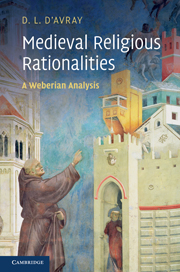Book contents
- Frontmatter
- Contents
- Preface and acknowledgements
- Abbreviations
- 1 Preliminaries
- 2 Medieval values: structures
- 3 Medieval values: dynamics
- 4 The value–instrumental interface in the Middle Ages
- 5 Formal rationality and medieval religious law
- 6 The formal–substantive interface and the dispensation system
- General conclusion
- Bibliography
- Index of manuscripts
- General index
4 - The value–instrumental interface in the Middle Ages
Published online by Cambridge University Press: 05 June 2012
- Frontmatter
- Contents
- Preface and acknowledgements
- Abbreviations
- 1 Preliminaries
- 2 Medieval values: structures
- 3 Medieval values: dynamics
- 4 The value–instrumental interface in the Middle Ages
- 5 Formal rationality and medieval religious law
- 6 The formal–substantive interface and the dispensation system
- General conclusion
- Bibliography
- Index of manuscripts
- General index
Summary
In the sister volume on Rationalities in History the symbiosis or mutual dependence of instrumental and value rationality is a major theme. On the one hand, value rationality shapes and colours instrumental reasoning so that the latter's essentially universal character is hard to perceive. On the other hand, instrumental rationality helps explain how values are perpetuated over time. Instrumental techniques make ideas concrete and vivid and bring out the coherence of systems and the connections between their various parts, preventing defections from value systems and transmitting them from one generation to the next. The present chapter draws out and examines more closely, with reference to medieval data, particular aspects of this analysis.
The first part of the chapter, (a), exemplifies from medieval evidence the reproduction of values through instrumental technique. The next section, (b), focuses on medieval spirituality. The sister volume Rationalities in History suggests that there is an ‘instrumental rationality of spirituality’ just as much as of the phenomena grouped under the heading of ‘modernity’. That is certainly true of the Middle Ages, and one can go further and show that there was a self-conscious awareness of spirituality's instrumental aspects. The third section, (c), returns to the question of the universality of instrumental rationality, developing the argument that instrumental rationality can transcend cultures and religions without being perceptibly the same everywhere: it is common to human societies, but only comes out seeming similar insofar as the underlying values overlap.
- Type
- Chapter
- Information
- Medieval Religious RationalitiesA Weberian Analysis, pp. 93 - 121Publisher: Cambridge University PressPrint publication year: 2010

